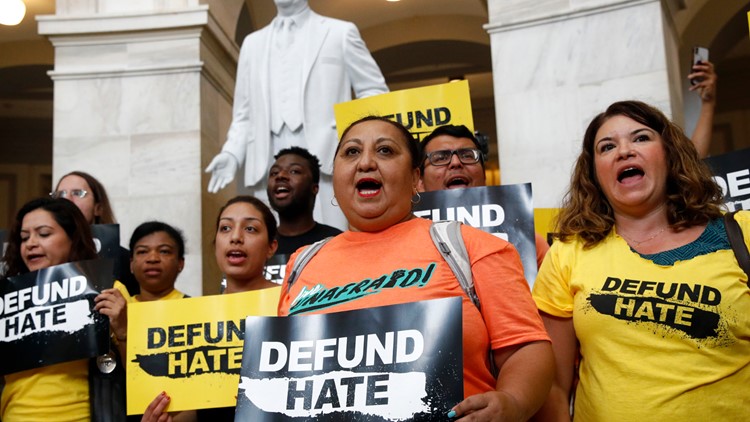WASHINGTON — It took last-minute changes and a full-court press by top Democratic leaders, but the House passed with relative ease Tuesday a $4.5 billion emergency border aid package to care for thousands of migrant families and unaccompanied children detained after crossing the U.S.-Mexico border.
The bill passed along party lines after House Speaker Nancy Pelosi quelled a mini-revolt by progressives and Hispanic lawmakers who sought significant changes to the legislation. New provisions added to the bill Tuesday were more modest than what those lawmakers had sought, but the urgent need for the funding — to prevent the humanitarian emergency on the border from turning into a debacle — appeared to outweigh any lingering concerns.
The 230-195 vote sets up a showdown with the Republican-led Senate, which may try instead to force Democrats to send Trump a different, and broadly bipartisan, companion measure in coming days as the chambers race to wrap up the must-do legislation by the end of the week.
"The Senate has a good bill. Our bill is much better," Pelosi, D-Calif., told her Democratic colleagues in a meeting Tuesday morning, according to a senior Democratic aide who spoke on condition of anonymity to describe the private session.
"We are ensuring that children have food, clothing, sanitary items, shelter and medical care. We are providing access to legal assistance. And we are protecting families because families belong together," Pelosi said in a subsequent floor speech.
The bill contains more than $1 billion to shelter and feed migrants detained by the border patrol and almost $3 billion to care for unaccompanied migrant children who are turned over the Department of Health and Human Services. It seeks to mandate improved standards of care at HHS "influx shelters" that house children waiting to be placed with sponsors such as family members in the U.S.
Both House and Senate bills ensure funding could not be shifted to Trump's border wall and would block information on sponsors of immigrant children from being used to deport them. Trump would be denied additional funding for Immigration and Customs Enforcement detention beds.
"The President's cruel immigration policies that tear apart families and terrorize communities demand the stringent safeguards in this bill to ensure these funds are used for humanitarian needs only — not for immigration raids, not detention beds, not a border wall," said House Appropriations Committee Chairwoman Nita Lowey, D-N.Y.
The White House has threatened to veto the House bill, saying it would hamstring the administration's border security efforts, and the Senate's top Republican suggested Tuesday that the House should simply accept the Senate measure — which received only a single "nay" vote during a committee vote last week.
"The idea here is to get a (presidential) signature, so I think once we can get that out of the Senate, hopefully on a vote similar to the one in the Appropriations Committee, I'm hoping that the House will conclude that's the best way to get the problem solved, which can only happen with a signature," said Senate Majority Leader Mitch McConnell, R-Ky.
A handful of GOP conservatives went to the White House to try to persuade Trump to reject the Senate bill and demand additional funding for immigration enforcement such as overtime for border agents and detention facilities run by Immigration and Customs Enforcement, according to a top GOP lawmaker who demanded anonymity to discuss a private meeting. Trump was expected to reject the advice.
House Democrats seeking the changes met late Monday with Pelosi, and lawmakers emerging from the Tuesday morning caucus meeting were generally supportive of the legislation.
Congress plans to leave Washington in a few days for a weeklong July 4 recess, and pressure is intense to wrap up the legislation before then. Agencies are about to run out of money and failure to act could bring a swift political rebuke and accusations of ignoring the plight of innocent immigrant children.
Longtime GOP Rep. Tom Cole of Oklahoma said Democrats were simply "pushing partisan bills to score political points and avoiding doing the hard work of actually making law," warning them that "passing a partisan bill through this chamber won't solve the problem."
Lawmakers' sense of urgency to provide humanitarian aid was amplified by recent reports of gruesome conditions in a windowless Border Patrol station in Clint, Texas, where more than 300 infants and children were being housed. Many were kept there for weeks and were caring for each other in conditions that included inadequate food, water and sanitation.
By Tuesday, most had been sent elsewhere. The incident was only an extreme example of the dire conditions reported at numerous locations where detainees have been held, and several children have died in U.S. custody.
The Border Patrol reported apprehending nearly 133,000 people last month — including many Central American families — as monthly totals have begun topping 100,000 for the first time since 2007. Federal agencies involved in immigration have reported being overwhelmed, depleting their budgets and housing large numbers of detainees in structures meant for handfuls of people.
Changes unveiled Tuesday would require the Department of Homeland Security to establish new standards for care of unaccompanied immigrant children and a plan for ensuring adequate translators to assist migrants in their dealings with law enforcement. The government would have to replace contractors who provide inadequate care.
Many children detained entering the U.S. from Mexico have been held under harsh conditions, and Customs and Border Protection Chief Operating Officer John Sanders told The Associated Press last week that children have died after being in the agency's care. He said Border Patrol stations are holding 15,000 people — more than triple their maximum capacity of 4,000.
Sanders announced Tuesday that he's stepping down next month amid outrage over his agency's treatment of detained migrant children.
In a letter Monday threatening the veto, White House officials told lawmakers they objected that the House package lacked money for beds the federal Immigration and Customs Enforcement agency needs to let it detain more migrants. Officials also complained in the letter that the bill had no money to toughen border security, including funds for building Trump's proposed border wall.



